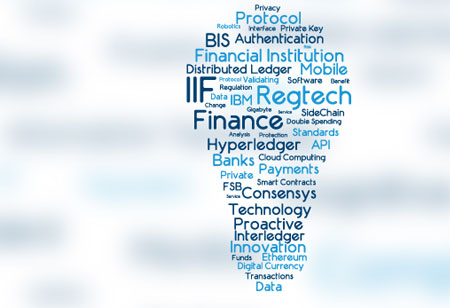THANK YOU FOR SUBSCRIBING
The Rising Trends of RegTech in Investment
Regulators continue to invest in advancing and enhancing their technological abilities to process and evaluate a massive amount of data efficiently and to support their supervisory activities in different areas.

By
Apac CIOOutlook | Tuesday, August 13, 2019
Stay ahead of the industry with exclusive feature stories on the top companies, expert insights and the latest news delivered straight to your inbox. Subscribe today.
Technology allows businesses and people to stay constantly available in a rapidly shifting environment, and everyone is even more reliant on it.
FREMONT, CA: The increase in mobile use, the rise of social media, and the growth of digitization have made way for an exponential rise in the amount of data on hand. More than 90 percent of the available data was created in the last five years. All of it was possible because of big data companies with their analysis and the use of ML and Artificial Intelligence technology to create the never before insights.
Regulatory Investment in Tech:
Regulators continue to invest in advancing and enhancing their technological abilities to process and evaluate a massive amount of data efficiently and to support their supervisory activities in different areas.
Recently, regulators have chosen a risk-based approach to compliance and made significant investments in their technology tools and operations. They expect firms to be practical in monitoring, protecting, and solving compliance issues within their operations. But the data management needed to meet these prospects is expensive and inefficient when it comes to using manual processes solely.
The issues tied with reality reflect that investment firms are required to make their advances and investments in regulatory technology (RegTech) to stay ahead or close to the regulators.
RegTech and Compliance Operations:
There are various tech tools available that can help firms to meet their regulatory obligations competently and cost-effectively.
• Identify Market Abuse and Non-Compliant Trades:
Not a single firm or compliance team will be glad to know about the market abuse among employees after the regulators get the information. Regulators have the power to process market data faster and professionally, to expose market abuse and other financial crimes.
There are analytical tools that enable examiners to crunch vast volumes of trading data and support blotter data validations. It also allows to watch out for anti-money laundering, reviews, and options of broker-dealer information. Meanwhile, there are data processors, which help in receiving market data types, including daily transaction reports to catch-hold of suspicious activities in trading records.
Firms need to make sure the surveillance of their electronic communications programs is accurately tuned to conduct businesses. It can help the regulators on both sides to focus on the automatic communication oversight programs. Additionally, to the electronic communications surveillance, conferences and events receive elevated attention from regulators. It makes it essential for the firm analysts or portfolio managers to conduct meetings carefully with ideal partners as they are under focus.
• Taking Care of Personal Trading Programs and Employee Activities:
The rules and regulation regarding codes of ethics in every nation are quite well-established. The tracking of personal trading, political contributions, entertainment, and other business activities to discover conflicts of interest is needed.
Firms have been feeling the weight in other areas as well; for example, the technological approach to transaction monitoring reflects that regulators are picking up suspicious personal trades more than ever before. It is predicted that the financial authorities might also be able to identify correlations between a firm and its employee trading provided they have the personal identifiers in the report. Ultimately, personal trading or codes of ethics technology solutions are growing increasingly popular, particularly with financial firms.
• Handling Third-Party Cyber Risk:
For several years and in the present times, cybersecurity has remained a regulatory focus area. The third-party vendors keep on posing considerable risks to the firms, and as per the findings of the financial authorities’, major data breaches seem to be rising fast in 2019.
Organizations require to have a proactive approach to third-party risk management by keeping ongoing due diligence on the vendors with whom they run business. RegTech, with a reliable outsourced third-party risk management solution, can lend a hand in reducing the burden, risks, and costs involved with tackling the vendor life-cycle.
• Restructuring Marketing Review Workflows:
With the help of financial services organizations, regulators around the globe are cracking down on marketing practices. Some frameworks are expanding the marketing demands on firms and carrying out the market being fully compliant with the enhanced standards of the context, irrespective of their medium of communication.
The compliance team needs to come up strongly to fight and handle the mistakes, which can creep in easily. They should create auditable processes to manage, review, approve, and archive marketing as well as advertising materials. Furthermore, an automated method for submitting materials to regulators can be used to reduce the number of steps in a process.
• Keeping track of Compliance Activities and Tasks:
All around the world, regulators have been increasingly expecting the organizations to keep records of their compliance activities in detail. Particularly, when it comes to regulators, anything that has not been documented in an auditable manner has never happened.
To keep track of every activity manually can be a burden on the firms. The RegTech industry is providing firms to meet their obligations by automating the collection and processing of information, risk-monitoring, regulatory compliance, everyday compliance task, tracking, and logging, including every material linked to compliance activity. The abilities to record processes with complete audit trail and document management fulfills the technology package utilized to satisfy responsibilities.
• Integrating Regulatory Filings:
Regulators today are utilizing technology to operate and examine via regulatory filings and determine which firms they need to observe in a year. The technology solutions being implemented by the firms are crunching the numbers in reports to identify anomalies or different problematic data.
The improved supervisory abilities make it vital that firms get their filings right to avoid risking the cost as well as the distraction of a possible regulatory exam. The updated systems allow organizations to make applications and notifications to the regulators with an ability to track the case status.
RegTech Return and Investment:
With the help of RegTech compliance, teams can achieve a considerable return on their investment by escalating operational capabilities, minimizing administrative costs, and declining the risk of violations. Moreover, regulators continue to develop their expectations regarding the compliance technology capabilities of the investment firms and simultaneously grow their systems. To keep up the pace with the changes, organizations require adopting their RegTech solutions; else they might be risking regulatory scrutiny, reputational damage, fines, and other complications.





